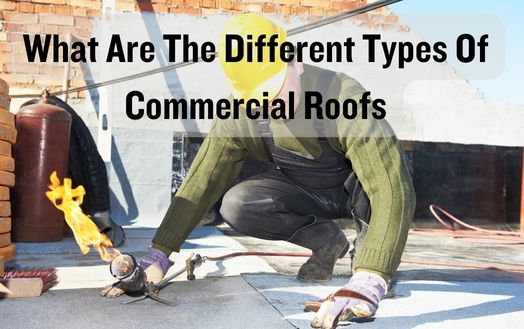
As I gaze upon the sprawling cityscape, I am reminded of the intricate web of commercial roofs that shelter the bustling businesses below.
From the sturdy stronghold of built-up roofs to the sleek resilience of single-ply roofs, there exists a diverse array of roofing options for commercial structures. But what are the distinguishing features of each type? How do they differ in terms of durability, cost, and maintenance requirements?
Join me as we explore the world of commercial roofs and uncover the secrets that lie beneath the surface. In this article, we will discover what are the different types of commercial roofs.
Due to their durability and longevity, built-up roofs are popular in commercial buildings. These roofing systems are strong and reliable, making them long-lasting.
Multiple layers of roofing material distinguish built-up roofs from other systems. These layers usually include a base sheet, several roofing felt layers, and gravel or asphalt. Layered construction is ideal for commercial buildings because it protects and insulates.
Built-up roofs are popular because they can withstand the weather. These roofs can withstand heavy rain, strong winds, and extreme temperatures. This makes them a reliable option for businesses that want a durable roofing system.
Durable built-up roofs are also known. Proper maintenance and inspections can extend these roofs’ lifespans to decades, making them cost-effective. Built-up roofs are popular with businesses seeking reliability and value due to their durability and longevity.
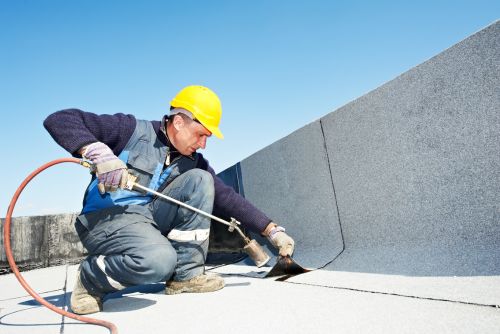
Commercial single-ply roofs are versatile and efficient. The single-layer roofing material on these roofs provides excellent weather protection and is lightweight and easy to install. Here are three reasons single-ply commercial roofs are popular:
Metal roofs are popular for commercial buildings due to their durability and longevity. Metal roofs offer innovative commercial roofing options to meet businesses’ diverse needs. Each type of metal roof has its own benefits and characteristics.
Commercial roofing often uses standing-seam metal roofs. This roof has vertical metal panels with raised seams for a sleek, modern look. Standing seam roofs are ideal for harsh-climate commercial buildings due to their durability and weather resistance.
Metal shingle roofs, which resemble wood or slate, are also popular. Metal shingles combine the durability and longevity of metal roofing with a more traditional look. These shingles come in a variety of colors and styles and are made of aluminum and steel.
Metal roof tiles can mimic clay or concrete roofing materials. These tiles look unique and innovative on commercial buildings while providing the same durability and performance as other metal roofs.
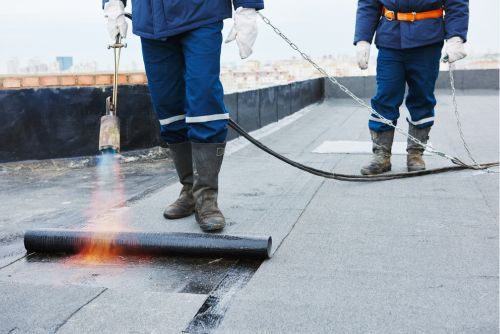
Modified bitumen roofs are versatile and perform well, making them popular for commercial buildings. This roof is made from modified bitumen, a type of asphalt with polymers added for durability and flexibility.
Modified bitumen roofs are great for commercial buildings for three reasons:
Commercial buildings need creative solutions to meet modern business needs. Modified bitumen roofs provide commercial property owners with durability, versatility, and energy efficiency.
Commercial roofing with modified bitumen roofs is reliable and cost-effective for large warehouses, office buildings, and retail spaces. These roofs provide commercial property owners with long-term value and peace of mind due to their durability, ease of installation, and energy efficiency.
TPO roofs are durable and energy-efficient, making them popular for commercial buildings. Innovative businesses choose TPO for commercial roofing. TPO roofs are thermoplastics made from polypropylene and ethylene-propylene rubber, combining their best qualities.
Durability is a major benefit of TPO roofs. They can withstand UV, ozone, and chemical exposure, making them suitable for many environments. Commercial buildings with heavy equipment or foot traffic benefit from TPO roofs’ puncture resistance.
Besides durability, TPO roofs are energy efficient. Our white reflective TPO roofs reduce heat absorption, keeping the building cooler and reducing air conditioning needs. This can save commercial building owners a lot of energy and money.
Another benefit of TPO roofs is their ease of installation. Lightweight and flexible TPO roofing systems are easier and faster to install than other roofing types. This can reduce business disruptions during installation.
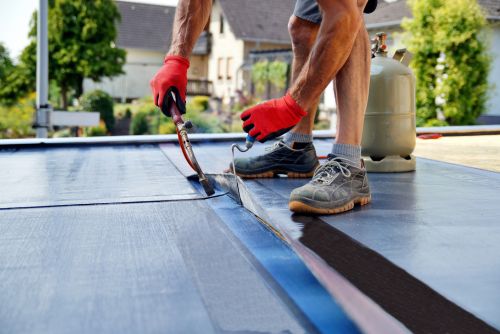
What are the different types of commercial roofs? Can commercial buildings use EPDM roofs for durability and energy efficiency?
EpDM roofs are great for commercial roofs. EpDM roofs are popular for commercial buildings for three reasons:
Superior Durability: Epdm roofs are highly durable and can withstand extreme weather conditions, including hail, high winds, and UV rays. This makes them a long-lasting option for commercial buildings, reducing the need for frequent repairs or replacements.
Energy Efficiency: EPDM roofs have excellent insulation properties, helping to regulate temperature and reduce energy consumption. This can result in lower heating and cooling costs for commercial buildings, making them more environmentally friendly and cost-effective.
Versatile Roofing Material: EPDM roofs are flexible and can be installed on various roof types, including flat and low-sloped roofs. They’re available in different thicknesses, allowing for customization based on the specific needs of the commercial building.
EPDM roofs are durable and energy-efficient, so innovative commercial building owners and developers are choosing them. EPDM roofs are a sustainable and cost-effective commercial roofing option that can withstand harsh weather and reduce energy consumption.
It’s important to compare commercial roof materials and types. EPDM roofs are ideal for modern commercial buildings due to their durability, energy efficiency, and versatility.
Green roofs are becoming more popular in commercial building construction due to their environmental benefits. Green roofs are an innovative way to boost building efficiency and sustainability.
Energy savings are a major benefit of green roofs. Green roofs regulate building temperatures by adding insulation, reducing heating and cooling needs. This reduces business utility costs and energy use. Green roof plants absorb carbon dioxide, improving air quality and reducing greenhouse gas emissions.
Stormwater management is another benefit of green roofs. Rainwater runs off traditional roofs into drains and sewers. However, green roofs absorb and retain rainwater, relieving drainage systems and preventing flooding. This reduces water pollution and environmental damage.
Green roofs are both environmentally and aesthetically beneficial. Unused rooftops can become vibrant gardens or recreation areas for employees and visitors. Green roofs make workers feel good and boost productivity.
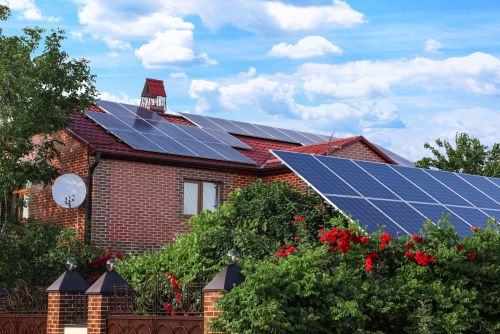
As we discuss the next commercial roof type, photovoltaic (Pv) roofs have environmental benefits. These innovative roofing systems convert solar power into electricity. Here are some reasons photovoltaic roofs are attractive for commercial buildings:
Photovoltaic roofs are shaking up commercial roofing. These innovative systems generate electricity sustainably and provide reliable roofing. Businesses can save money, reduce their carbon footprint, and help the environment by using solar power.
Photovoltaic roofs are a green and functional commercial roof option.
Asphalt roofs are popular for commercial buildings due to their durability and affordability. Asphalt roofs are popular commercial roofs. They’re made from asphalt shingles, which are made of asphalt and fiberglass, or organic materials. Strength and weather resistance are hallmarks of this roofing material.
Asphalt roofs’ affordability is a major benefit. Commercial building owners who want to cut costs may prefer them because they’re cheaper than other roofing materials. Asphalt roofs can last 20–30 years with proper maintenance. Once installed, they need few repairs or replacements, saving time and money.
Asphalt roofs are also stylishly versatile. Their wide range of colors and textures lets commercial building owners choose a roofing option that matches their aesthetic. Asphalt roofing suits every style, from modern to traditional.
Asphalt roofs are easy to install. A building owner can choose to install them in large sheets or individual shingles. This speeds up installation and cuts labor costs.
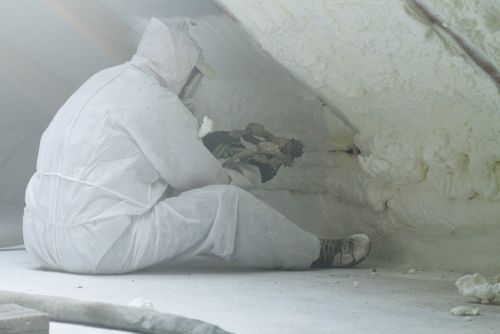
Spray foam roofs are seamless and energy-efficient for commercial buildings. Spray foam roofs are popular in commercial roofing due to their unique benefits. There are three reasons spray foam roofs are innovative for commercial buildings:
Spray foam roof installation requires skilled workers. Roof effectiveness and longevity depend on proper installation. Preparing the surface, applying the foam, and coating it with an elastomeric coating for durability are the steps.
It’s time to talk about PVC roofs after discussing spray foam roofs.
Polyvinyl chloride (PVC) roofs are popular for commercial roofing systems due to their durability, energy efficiency, and versatility. The flat roofs of commercial buildings with large surfaces are ideal for PVC roofing.
UV resistance and weather resistance are PVC roofs’ main benefits. They can withstand even the harshest environmental conditions due to their durability and longevity. PVC roofs’ high reflectivity reduces heat absorption and energy costs. Commercial buildings that need efficient temperature control and want to reduce their carbon footprint need this.
Another benefit of PVC roofing is flexibility. New and retrofitting commercial roofs can use PVC membranes because they can be easily customized to fit any shape and size. The installation process is quick and easy, minimizing business disruption.
Additionally, PVC roofs require little to no maintenance over their lifespan. They resist mold, mildew, and pests, keeping employees and customers safe. Proper installation and regular inspections can extend PVC roofs’ lifespan to 30 years or more, saving money over time.
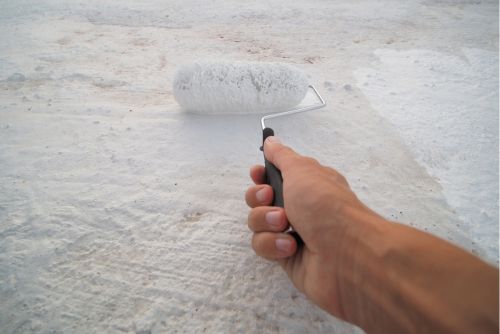
Silicone membrane roofs are durable and waterproof for commercial roofing systems. The industry is adopting these innovative roofs due to their many benefits.
Here are three reasons silicone roofs are great for commercial roofs:
Superior Waterproofing: Silicone roofs provide exceptional waterproofing capabilities, ensuring that your commercial building remains protected from water damage. The silicone membrane forms a seamless, watertight barrier that seals out moisture, preventing leaks and potential structural issues.
Fiberglass roofs are durable and affordable for commercial buildings. Fiberglass commercial roofs are popular due to their many benefits.
Fiberglass roofs are strong and lightweight, making them ideal for new construction and roof replacement. Durability is a major benefit of fiberglass roofs. Woven glass fibers coated with resin make these roofs crack-, warp-, and rot-resistant. Their durability makes them resistant to high winds, rain, and extreme temperatures. Fiberglass roofs last longer than other roof types, reducing the need for repairs and replacements.
Fiberglass roofs are durable and affordable for commercial buildings. Fiberglass is lightweight and easy to install, saving time and money on labor. Fiberglass roofs last longer, reducing maintenance and replacement costs.
Fiberglass roofs also insulate well. The material reflects heat, keeping the building cool and lowering air conditioning costs. Fiberglass roofs are eco-friendly and meet the growing demand for sustainable building materials.
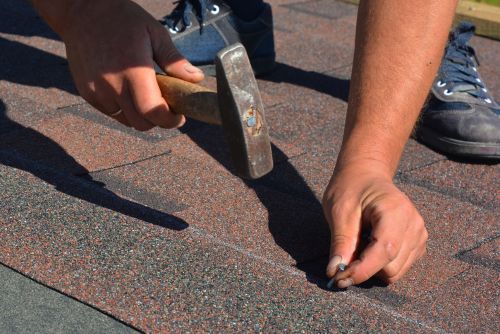
Why are shingle roofs popular for commercial buildings?
Shingle roofs offer many benefits for commercial buildings and are versatile and innovative. Here are three reasons businesses should choose shingle roofs:
Shingle roofs are attractive for commercial buildings due to their durability, aesthetics, and energy efficiency. Their flexibility lets businesses design a unique, attractive roofing solution. Shingle roofs are a durable, attractive, and energy-efficient option for your building.
In conclusion, there are various types of commercial roofs available for different needs and preferences. From built-up roofs to single-ply roofs, metal roofs to shingle roofs, there’s a wide range of options to choose from.
Each type has its own advantages and disadvantages, so it’s important to consider factors such as durability, cost, and energy efficiency when deciding on the best commercial roof for your building.
Ultimately, selecting the right roof can help ensure the longevity and protection of your commercial property. In this article, we have answered the question – what are the different types of commercial roofs?
Yes, commercial roofs made from fiberglass can be suitable for all types of climates.
Fiberglass is known for its durability and resistance to extreme weather conditions. It can withstand high winds, heavy rain, and even intense heat. Additionally, fiberglass roofs are lightweight, which makes them easier to install and maintain.
Photovoltaic (PV) roof installation differs from other commercial roofs in several ways. To maximize sunlight exposure, PV panels must be properly positioned and secured. Second, carefully install electrical wiring and connections to transfer solar energy efficiently. Finally, regular maintenance and monitoring are essential for PV roof performance and clean, renewable power generation.
Green roofs have many benefits for commercial buildings. They insulate, reduce stormwater, and improve air quality. Green roofs are not suitable for all structures due to structural limitations or inadequate support systems.
A green roof’s feasibility depends on the building’s structural capacity and expert advice. Green roofs help businesses create sustainable, creative, and environmentally conscious spaces.
The durability and longevity of silicone roofs make them superior to other commercial roofs. Silicone roofs have survived extreme heat and rain without deteriorating. They resist mold and mildew and require little maintenance.
Silicone roofs reflect sunlight, reduce cooling costs, and boost building energy efficiency.
Asphalt roofs require different maintenance than other commercial roofs. To detect cracks, leaks, and damage, inspect regularly.
Cleaning up debris and draining properly prevents water buildup. Resealing or reapplying protective coatings may also extend asphalt roof life.
A proactive maintenance plan can prevent costly repairs and prolong roof life.